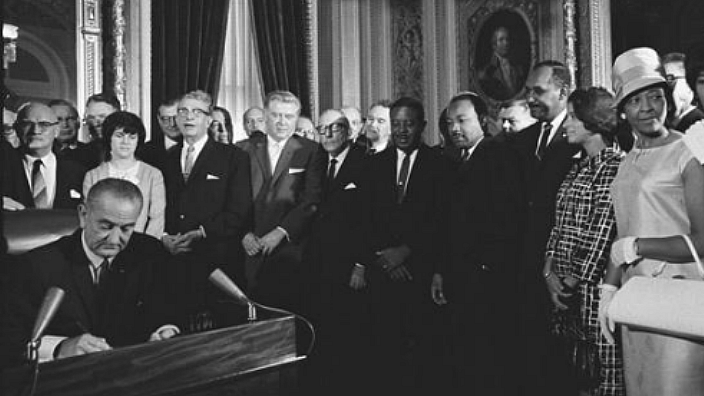Editor’s note: The following article is an op-ed, and the views expressed are the author’s own. Read more opinions on theGrio.
On Aug. 6, 1965, 58 years ago today, congressional leaders, Martin Luther King Jr., Rosa Parks and many others crowded into the President’s Room near the U.S. Senate Chamber to watch President Lyndon Baines Johnson sign the Voting Rights Act.
It was just one day. But what a day it was — a day not only to remember, but to revere, to respect, to emulate and, with all that’s happened to reverse that historic moment, to recreate.
When you’re looking down the long line of our nation’s history, some days just stick out. For us, one of those days is Aug. 6, 1965.
To say it was a turbulent time in American history is an understatement of massive proportions. After all, this was less than two years after President Kennedy had been assassinated in Dallas and only a few months into Johnson’s first full term.
In June 1964, 14 months earlier, white supremacists had killed James Chaney, Andrew Goodman and Michael Schwerner in Philadelphia, Miss., for daring to register Black folks to vote and, in March, Sheriff Jim Clark and some 200 Alabama State Troopers brutally attacked more than 500 peaceful civil rights demonstrators crossing the Edmund Pettus Bridge in Selma, Ala., among them future Congressman John Lewis.
But somehow, in the midst of all that violence and hate, Dr. King, President Johnson and so many more chose to respond not with further violence but by expanding and guaranteeing that most fundamental part of what means to be free — the right to vote.
It was the culmination of generations of struggle and sacrifice and, frankly, we can’t think of anything more American.
We understood then that voting rights were the most consequential issue of the day, and we acted like it. But we also knew that every step against oppression was always met with vocal and often violent backlash from the oppressors. So just as the Lost Cause myth, Jim Crow and Ku Klux Klan followed the Civil War, Reconstruction and the 14th, 15th and 16th Amendments to the Constitution, the persecutors and autocrats launched their southern strategies to roll back voting rights since pen touched paper on Aug. 6, 1965.

The slow erosion of our right to vote
Of course, it’s taken them 58 years, but the strategy of slow erosion and entropy has not only been relentless, but it also continues to this day and since the GOP activists on the Supreme Court gutted the Voting Rights Act in 2013, the voting rights rollback has been on steroids.
Look at Arizona’s GOP-controlled state legislature gutting their Permanent Early Voting List after those voters cast their ballots for President Biden in 2020. Look at Georgia Republicans cutting mail-in ballot access by half as well as instituting new voter ID restrictions on top of those they passed following Black voter turnout surged in 2008. Look at Texas, which already had some of the most restrictive election rules in the country, making it a crime to help voters cast their ballots and more.
Look at Ronald Miller, who was in his underwear when police officers surrounded his Miami home and arrested him at gunpoint back in August. They didn’t even let him put his pants on before they put him in handcuffs and took him away.
What was his crime? Was he some kind of drug kingpin or leg breaker? Was he a major threat with an illegal stash of automatic weapons? Nope. He’d simply exercised his right to vote, but Florida Gov. Ron DeSantis wanted to make a point and strike fear in people as they contemplated exercising that right.
The players are different, but the playbook is the same.
Between January 1, 2022, and September 12, 2022 alone, at least seven states enacted 10 laws making it harder to vote and since the beginning of 2021, lawmakers have passed at least 42 laws to restrict your right to vote in 21 states. That’s almost half the country, and it’s just some of the hundreds of bills we’ve seen aimed at restricting our most basic democratic right to vote since Black Americans came out in droves to vote for Joe Biden in the 2020 election.
Now the MAGA extremists who have hijacked the Republican Party are so empowered that even after their own right-wing activist Supreme Court ruled that Alabama’s new GOP-approved congressional map was so gerrymandered and so racist that the GOP legislature had to redraw it, they refused.
The fight is still ongoing
So here we are putting a fresh set of eyes and ears on an old problem. Voting rights is still the most consequential issue of our day and, as a result, we must be more relentless in our efforts to secure the right to vote than those who are doing their best to take it away.
Simply put, the right to vote keeps us at the table so we’re not on the menu. That’s why the racist right wing is so eager to take it away because they know that, from the newly enfranchised Black voters of Reconstruction to the Black voter surges of 2006, 2008, 2012, 2019 and 2020, when we show up at the ballot box, we have the power to shift the political tectonic plates in this country.
In 2020 alone, Black voters accounted for 20% of all Democratic votes in Michigan. In Pennsylvania, where we’re only 12% of the population, we represented 21% of the Democratic vote. And in Georgia, more than half of all Democratic voters were Black.
Do you think that matters for President Biden? Of course it does. Do you think it matters to Sen. John Fetterman of Pennsylvania or Sens. Jon Ossoff and Ralph Warnock from Georgia? Absolutely.
When Black voters show up, Democrats win. That’s why the Republicans are using every tool at their disposal to keep us home.
That’s exactly what happened when Gov. DeSantis and Klanmates took a page from “Pitchfork” Ben Tilman and Gray’s Red Shirts. DeSantis didn’t want the Black men who benefitted from restored voting rights to actually exercise them. So, he made an example and sent a clear message: This is what happens if you vote. You’re not a real American and if you think you are, we’re going to put you in a cage.
This isn’t some game or political ploy. This is real and the stakes are high. That’s why, in spite of those efforts to silence us, we’ve always stepped up to do our part. That’s how we fight back and fight forward.
This fight for our right to vote is a life-and-death struggle for us. But it’s not new. We’ve seen Voter ID laws. We’ve seen eligible Black voters purged from the rolls in red states. We’ve seen GOP leaders cut voting resources in Black communities causing lines that circle the block and then some. We’ve seen intimidation, subjugation and outright racism, and we’ve heard the dog whistles. But we’re not afraid.
We know this fight well. We’ve been fighting it for generations. We have put our lives on the line to secure that right time and time again, and you can be damn sure we’ll do it again because, despite what Gov. DeSantis and Donald Trump think, despite what the GOP legislatures in Arizona, Texas and Georgia think, despite what the MAGA hardliners across America think, we are Americans. We deserve the same rights, the same respect and the same vote they do — and we won’t stop until we get it.
When you’re looking down the long line of our nation’s history, some days just stick out. This is one of them. This is our moment. This is our vote.
In the words of the late Congressman John Lewis, “The right to vote is precious, almost sacred. It is the most powerful nonviolent tool or instrument in a democratic society. We must use it.”
Fifty-eight years ago today, President Johnson signed the Voting Rights Act and won a battle for the forces of progress and democracy. Fifty-eight years later, it’s time to win the war.

Antjuan Seawright (@antjuansea) is a Democratic political strategist, founder and CEO of Blueprint Strategy LLC, a CBS News political contributor, and a senior visiting fellow at Third Way

Congressman Steven Horsford represents Nevada’s 4th Congressional District and is the Chairman of the Congressional Black Caucus.
TheGrio is FREE on your TV via Apple TV, Amazon Fire, Roku, and Android TV. Please download theGrio mobile apps today!


